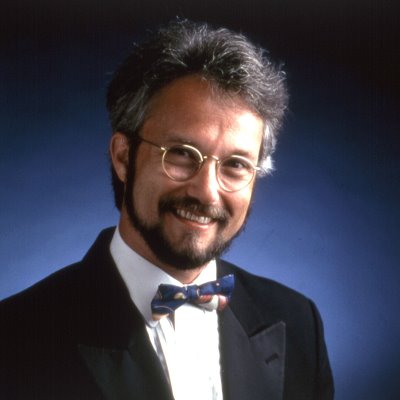

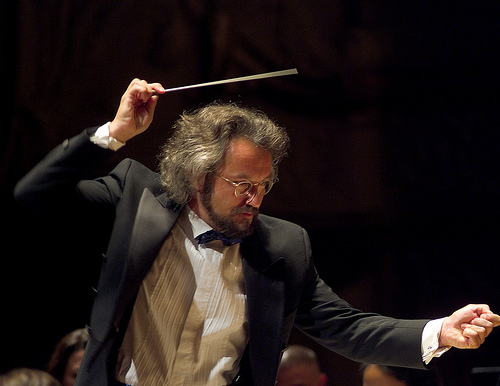 CK: No, no, the
composer is more. The composer
is absolutely more, because certainly you have to invent the
music while you interpret. But being honest, I
don’t think that the work of a conductor is so creative. I think
the work of a composer is creative, but we
are recreating something which was already created some years ago,
maybe some centuries ago. I think the work of the conductor
has not to be overrated. I always say for the audience, “Don’t
overrate the work of a conductor;”
for the
musicians in the orchestra, “Don’t
underrate it.”
CK: No, no, the
composer is more. The composer
is absolutely more, because certainly you have to invent the
music while you interpret. But being honest, I
don’t think that the work of a conductor is so creative. I think
the work of a composer is creative, but we
are recreating something which was already created some years ago,
maybe some centuries ago. I think the work of the conductor
has not to be overrated. I always say for the audience, “Don’t
overrate the work of a conductor;”
for the
musicians in the orchestra, “Don’t
underrate it.”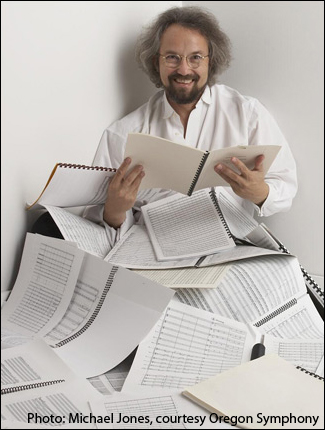 CK: Yes,
definitely. Definitely! At a certain time I was a little
specialized in Mozart because of my work
in the Zurich Opera House, and
certainly Mozart is a composer who is very important for me. But
I always try to do the whole repertoire. I avoid the
very ancient music before Bach because in my opinion
you can’t do that with modern instruments. And comparing maybe to
other conductors, I don’t do so often modern music, but I do
it. But I think about certain conductors, colleagues, who really
are absolutely specialized; I try not to specialize.
CK: Yes,
definitely. Definitely! At a certain time I was a little
specialized in Mozart because of my work
in the Zurich Opera House, and
certainly Mozart is a composer who is very important for me. But
I always try to do the whole repertoire. I avoid the
very ancient music before Bach because in my opinion
you can’t do that with modern instruments. And comparing maybe to
other conductors, I don’t do so often modern music, but I do
it. But I think about certain conductors, colleagues, who really
are absolutely specialized; I try not to specialize.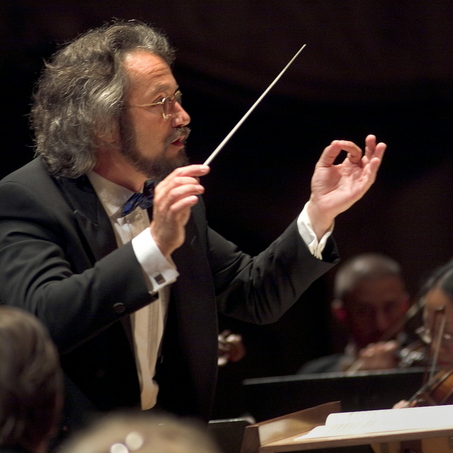 CK: Only concerning
chamber music. But what I
want to say is the only thing for me which is really interesting to
spend your whole life in — excluding conducting
— is singing. That’s the reason why, for me, to be in
the pit is so interesting,
because to express yourself with music and to use your own body and
your own voice is so overwhelming that I like it very much to work
with singers. Another topic which is very
important has something to do with breathing. If you don’t
breathe, you are not able to make music properly, and let me
tell you, if you don’t breathe, you are never able to conduct an
opera! [Both laugh] They have to breathe on stage, and if
you don’t breathe together, after the performance
the singers are going to kill you! That’s a real challenge, and I
like it
very much!
CK: Only concerning
chamber music. But what I
want to say is the only thing for me which is really interesting to
spend your whole life in — excluding conducting
— is singing. That’s the reason why, for me, to be in
the pit is so interesting,
because to express yourself with music and to use your own body and
your own voice is so overwhelming that I like it very much to work
with singers. Another topic which is very
important has something to do with breathing. If you don’t
breathe, you are not able to make music properly, and let me
tell you, if you don’t breathe, you are never able to conduct an
opera! [Both laugh] They have to breathe on stage, and if
you don’t breathe together, after the performance
the singers are going to kill you! That’s a real challenge, and I
like it
very much!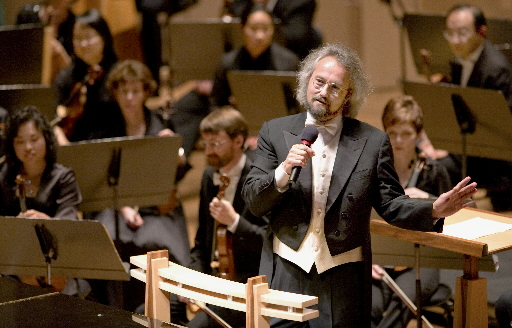 CK: The word “career”
is not so important for me
because career means that at a certain point in my life I have to be
Music Director of Berlin Philharmonic or Chicago Symphony or
whatsoever. Why should that happen? If it
happens, I certainly will like it! [Both laugh] It’s no
question. For me, the most
important thing is to make music with an orchestra and to make it as
good as I can. Therefore, I don’t think I would ever use the
word if I’ve already arrived at the point I want to arrive. You
always have to be studying, learning and going far.
CK: The word “career”
is not so important for me
because career means that at a certain point in my life I have to be
Music Director of Berlin Philharmonic or Chicago Symphony or
whatsoever. Why should that happen? If it
happens, I certainly will like it! [Both laugh] It’s no
question. For me, the most
important thing is to make music with an orchestra and to make it as
good as I can. Therefore, I don’t think I would ever use the
word if I’ve already arrived at the point I want to arrive. You
always have to be studying, learning and going far.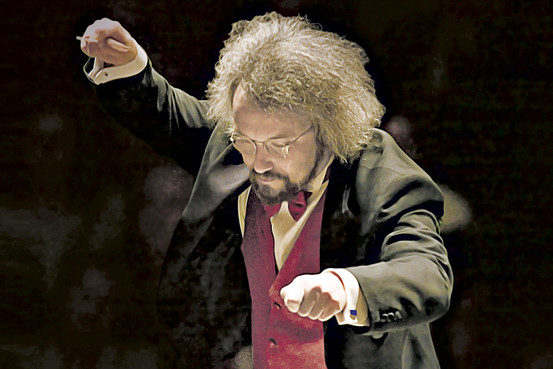 BD: Isn’t it, then,
your responsibility not to
cheat, to make an honest recording?
BD: Isn’t it, then,
your responsibility not to
cheat, to make an honest recording?The Uruguay-born conductor,
Carlos Kalmar was born of Austrian parents. He showed an interest in
music at an early age and began studying violin at age six. By age 15
his musical development led him to the Vienna Musikhochschule, where he
studied conducting with Karl Österreicher. In June 1984 won First
Prize at the Hans Swarowsky Conducting Competition in Vienna.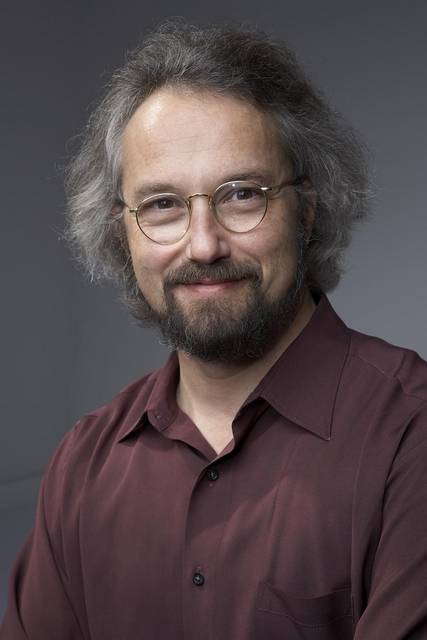 Kalmar has been music director of the Hamburger
Symphoniker (1987 to 1991), the Stuttgart Philharmonic (1991 to 1995)
and Anhaltisches Theater in Dessau, Germany (1996-2000). His symphony
and opera guest conducting engagements throughout Europe and North
America include return appearances with the Philadelphia Orchestra, the
Berlin Radio Symphony, the Chicago Symphony, the National Orchestra of
Spain, the Cincinnati Symphony, the ORT Orchestra of Florence, Lincoln
Center's Mostly Mozart Festival, the Hamburg State Opera, the Minnesota
Orchestra, the Vienna State Opera, the Detroit Symphony, the
Bournemouth Symphony Orchestra, and the Zürich Opera House, among
others. Kalmar has been music director of the Hamburger
Symphoniker (1987 to 1991), the Stuttgart Philharmonic (1991 to 1995)
and Anhaltisches Theater in Dessau, Germany (1996-2000). His symphony
and opera guest conducting engagements throughout Europe and North
America include return appearances with the Philadelphia Orchestra, the
Berlin Radio Symphony, the Chicago Symphony, the National Orchestra of
Spain, the Cincinnati Symphony, the ORT Orchestra of Florence, Lincoln
Center's Mostly Mozart Festival, the Hamburg State Opera, the Minnesota
Orchestra, the Vienna State Opera, the Detroit Symphony, the
Bournemouth Symphony Orchestra, and the Zürich Opera House, among
others.Carlos Kalmar made his German debut in April 1985 with the NDR Symphony Orchestra in Hamburg, which immediately invited him back for two more concerts. Further invitations to conduct in Germany followed, including the Bamberger Symphoniker, the Berlin Radio Symphony Orchestra, the Philharmonische Staatsorchester of Bremen, the Bochum Symphony Orchestra, Dortmund Philharmonic Orchestra, Essen Philharmonic Orchestra, the Frankfurt Museumsorchester and the NDR Radio Orchestra in Hannover. In June 2000, Carlos Kalmar made his highly successful British orchestra debut with the Royal Scottish National Orchestra as part of their prestigious "Scottish Proms" series in Glasgow. July 2000 saw his first concerts with the Philadelphia Orchestra. Other recent guest engagements included the Rio de Janeiro Opera House Orchestra, Sao Paulo Symphony Orchestra, Mozarteumorchester-Salzburg, Jeunesse Musicales World Orchestra, Frankfurt Radio Symphony Orchestra, Detroit Symphony, Vancouver Symphony, Saint Louis Symphony Orchestra, Dallas Symphony, and Colorado Symphony Orchestra, among others. In 2000 Carlos Kalmar became the Principal Conductor of the Grant Park Music Festival in Chicago. Until recently he was also Music Director of Vienna’s Tonkünstlerorchester. In 2003 he was appointed as Music Director of the acclaimed Oregon Symphony. During the 2003-2004 season, Carlos Kalmar’s guest conducting engagements in North America include the Saint Louis Symphony, the Dallas Symphony, the Philadelphia Orchestra, the Colorado Symphony, the New Jersey Symphony Orchestra, and the Juilliard Orchestra. Carlos Kalmar’s most recent recordings include the 2003 release of the Joachim and Brahms Violin Concertos featuring Rachel Barton and the Chicago Symphony, and American Works for Organ and Orchestra featuring David Schrader and the Grant Park Orchestra (2002), both on the Cedille Records label. International critics have called Carlos Kalmar "skillfully guiding and buoyant" (Chicago Tribune); "gutsy and precise" (Cincinnati Post); "graceful and intensely propulsive" (Portland Oregonian); "athletically vigorous" (Indianapolis Star); "crystal clear and transparent"; "stylistic feeling and musical fire" (Opernglas); "positively liberated" with "grit and propulsion" (New York Post). Carlos Kalmar resides in Vienna with his wife, Britta, and two daughters, Svenja and Katja. |
This interview was recorded in Chicago on July 12, 1999. Portions (along with recordings) were used on WNIB the next day and again thirteen months later; and on WNUR in 2004 and 2009. This transcription was made and posted on this website late in 2009. It has also been included in the internet channel Classical Connect.
Award - winning broadcaster Bruce Duffie was with WNIB, Classical 97 in Chicago from 1975 until its final moment as a classical station in February of 2001. His interviews have also appeared in various magazines and journals since 1980, and he now continues his broadcast series on WNUR-FM, as well as on Contemporary Classical Internet Radio.
You are invited to visit his website for more information about his work, including selected transcripts of other interviews, plus a full list of his guests. He would also like to call your attention to the photos and information about his grandfather, who was a pioneer in the automotive field more than a century ago. You may also send him E-Mail with comments, questions and suggestions.